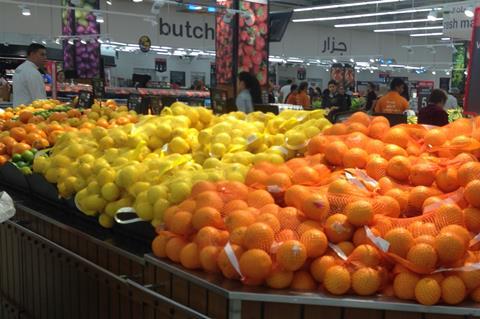Longer transit times due to disruptions in the Red Sea are a major issue for all traders in the Middle East region, but reshipments through Dubai appear to be growing as a result, says Hani Ayloush of Fruit Line Trading
It’s been a tumultuous few months in the Middle East, with Israel’s war on Gaza continuing and military exchanges with both Iran and Lebanon threatening to spill over into an even wider conflict, while the Houthis cause major disruptions in the Red Sea.
Yet the fruit and vegetables business has continued in Dubai, where traffic through the UAE hub has even risen for some products as a result of nearby transportation issues.

“The only real impact has been on the shipping lines and the transit times due to the conflict in the Red Sea,” said Hani Ayloush, owner of Dubai-based trader Fruit Line Trading. “This is the main effect on all business through the Suez Canal and into the Red Sea. It is a big issue. Shipping lines have increased their freight rates, transit times are increasing to as much as 60 days. So it’s very complicated. When you don’t have regular on-time shipments, prices increase. And many origins are choosing not to load shipments in order to avoid this risk, so supplies will be short.”
Fruit Line Trading handles big volumes of apples and oranges, but even these sturdy items can struggle with the longer journey. “Even apples, which are a resilient fruit,” said Ayloush, “they cannot last 60 days in transit, so it will affect the quality and therefore the price. In all cases, it’s not good.”
However, the company is starting to see an uptick in the reshipment of some products through Dubai. “We are seeing more in-transit traffic coming into Dubai, destined for other Middle Eastern countries,” he confirmed. “For example, for Lebanon and Jordan we are loading fruit by truck. This is a change from the recent past because more and more volumes have been going direct. In the past, for example, all produce used to go direct to Jordan. Now it goes via Dubai.”
In the company’s main market, Saudi Arabia, consumption remains stable, according to Ayloush, but prices can occasionally be higher due to shortages of supply. “The market is moving well and prices are better than last year,” he confirmed. “Our main market, Saudi Arabia, is doing well, as are others like Iraq.”
The volume of citrus coming to the Middle East from South Africa has been less than in previous years, despite production rising, so prices have been higher, said Ayloush, including for oranges. “For lemons, the prices started low and then increased after two or three weeks due to high demand,” he revealed. “When the US market is good, Latin American volumes stay in North America or go to Asia. Lower volumes to Europe mean prices in Europe are higher, so South Africa prioritises that market. Only then do these volumes come to the Middle East.”

Regarding apples, Ukraine is now sending large volumes to the Middle East, according to Ayloush. “Poland still has better quality and a better price,” he said, “and they are still shipping large volumes here too. Prices for US apples have come down to a reasonable level. After a few years of almost nothing on the market, there are now more and more volumes at a decent price. That is always the issue. When you are talking about high-end apples, you are comparing US with Italian, French or South African, so the price has to be able to compete. You’re not comparing them with Iranian apples. Of course, there is also a market for Iranian apples, but the price is completely different.”
When it comes to the Iraqi market, the risks remain high, Ayloush said. “The market is good for certain products at certain times, such as citrus, which we are loading at the moment,” he revealed. “The only issue is that you need a reliable client because it’s a dangerous market. You cannot guarantee your money unless you know someone 100 per cent. And if you have an issue, you can’t go there and ask for your money. There is no insurance, so the risk is very high.”



